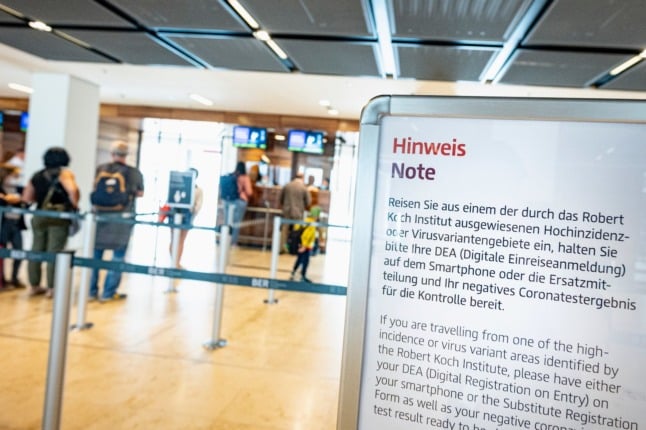Portugal, Britain and Northern Ireland, Russia, India and Nepal will be removed from the ‘virus variant’ list from Wednesday. They will be classed as ‘high incidence’ areas instead, the Robert Koch Institute announced on Monday evening.
It means that the entry ban currently in place will be lifted. Meanwhile, people who are fully vaccinated or have recovered from Covid-19 coming from ‘high incidence’ areas do not have to quarantine. They can also show their proof of vaccination/recovery before boarding a flight to Germany instead of a negative Covid test.
People coming from ‘high incidence’ areas who aren’t vaccinated have to provide a negative Covid test before departure to Germany, and quarantine for 10 days on arrival with the option to end it after five days with a negative Covid test.
READ ALSO: When might Germany ease travel rules for countries with the Delta variant of Covid?
Last week Chancellor Angela Merkel suggested that Germany would soon relax travel rules on people arriving from the UK due to the Delta variant being widespread in both countries.
“We think that in the foreseeable future those who have received double jabs will then according to our classification… be able to travel again without going into quarantine,” she had said.
What are the rules for ‘virus variant’ areas?
In total, Germany has three risk categories – virus variant, high incidence and basic risk area.
India was classified as a virus variant area at the end of April, followed by Nepal and the UK in May. The EU country Portugal, as well as Russia, were added to the list on June 29th.
In the highest Covid risk category for virus variants, drastic entry restrictions apply. These are:
– Airlines, bus and train companies are not allowed to transport people from virus-variant areas to Germany unless they are German citizens or have residence in Germany.
– Anyone entering Germany from virus-variant areas must quarantine for 14 days – even if he or she is fully vaccinated or recovered from Covid.
READ MORE: ‘Extremely strict’: What it’s like to travel from the UK to Germany right now
Earlier in June the EU summit in Brussels, Merkel had pushed in vain for common travel rules in the EU to curb the spread of the Delta variant.
However, experts say this variant is also widespread in Germany, even if the infection figures in the Bundesrepublik are significantly lower than in Portugal and the UK.
With the downgrading of the five countries, the number of ‘virus variant areas’ worldwide drops from 16 to 11. Among the remaining countries in the highest risk category are Brazil, Uruguay, South Africa and several other countries in Africa.
READ ALSO: Germany could ease travel rules for UK and Portugal soon, says Health Minister



 Please whitelist us to continue reading.
Please whitelist us to continue reading.
Does anyone know if young children have to quarantine if their parents are vaccinated? I have struggled to find a conclusive answer. The Ordinance from May 12 appears to give an exemption from isolation for those visiting first or second degree relatives provided they have a negative test. Section 6, 2 (b) (aa) – but I am not confident interpreting the translated version. Section 4 is the bit on isolation. Apologies if a stupid question.
(2) Section 4 also does not apply to the following:
1. Persons who are in possession of proof of testing and
a) the work they carry out is critical to maintaining
aa) the functioning of the health system, in particular doctors, nursing staff, medical support staff and carers,
bb) public safety and order,
cc) diplomatic and consular relations,
dd) the functioning of the administration of justice,
ee) the functioning of parliament, government and the administration at the federal, state and local level, or
ff) the functioning of the organs of the European Union and of international organisations,
b) are entering in order to
aa) visit first- or second-degree relatives, a spouse or life partner who does not form part of the same household,
or on account of shared custody or a right of access,